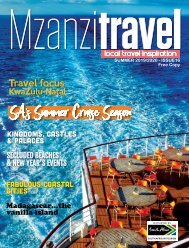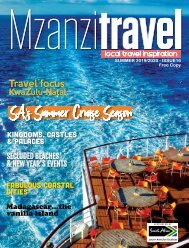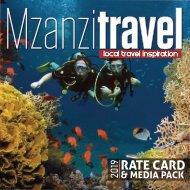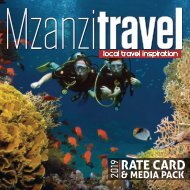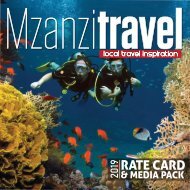You also want an ePaper? Increase the reach of your titles
YUMPU automatically turns print PDFs into web optimized ePapers that Google loves.
marinescapes and aquatic life. Some of the best are located off Mossel Bay,<br />
whether close to the coast around Seal Island, around The Point along the many<br />
sea-cliff caves, or out on the banks. There are plenty of corals, drop-offs, a great<br />
variety of fish as well as great white sharks.<br />
COME PARK<br />
WITH US<br />
Some of the most popular diving spots around Cape Town are found at Smitswinkel<br />
Bay and Partridge Point near Miller Point on the False Bay side of the Peninsula,<br />
and at Oudekraal and Duiker Island near Hout Bay along the Atlantic seaboard.<br />
You are likely to encounter great white sharks, penguins, seals, kelp forests and<br />
plenty other marine life, while these sites also have a number of wrecks that can<br />
be dived.<br />
Shipwreck diving<br />
With some 2,500 shipwrecks along South Africa’s coast – almost one wreck<br />
for every kilometre of coastline – shipwreck diving opportunities abound. It has<br />
become an extremely popular part of the diving experience.<br />
Airport Valet Parking<br />
offers a service that makes flying out<br />
of Cape Town International Airport<br />
convenient and hassle free. We are<br />
conveniently located on the ground<br />
floor of Parkade 2, clearly sign<br />
posted “Valet Parking”.<br />
Simply drive into Parkade 2 where<br />
one of our drivers will show you to<br />
our dedicated, reserved bays. Whilst<br />
you are away your vehicle is stored<br />
with us and given a valet. You will<br />
find your sparkling clean car<br />
waiting for you on your<br />
return. Talk about<br />
convenience!<br />
Make your travel<br />
experience a lot less<br />
stressful by allowing us<br />
to take care of your car<br />
while you’re away.<br />
park business class<br />
Imagine being suspended in clear blue waters under a bright summer’ sky. Below<br />
you is some 15m of clear water, teeming with marine life, and turning to a dark blue<br />
deeper down. You start your descent, slowly paddling with your flippers. And then,<br />
looming hauntingly up out of the depths you see a large structure, its rails and<br />
decks and superstructures covered with all sorts of colourful marine life and shells.<br />
Crabs slip into crevices. A variety of fish swim around and over the wreck, some<br />
popping inside through glassless portholes. A shark swims lazily around a funnel<br />
lying at an angle across the deck. You find a large gap in the side of the hull,<br />
torn open by the violence of striking rock. You signal to your diving buddies and<br />
swim through the gap into the bowels of the ship. You’re now in what was once<br />
the engine room, a place where apart from divers, no humans have been in the<br />
seventy years since the ship went down in a black stormy night.<br />
Many sunken ships remain in remarkably good condition on the ocean floor. Some<br />
that rest on sand may be half buried, storms and currents from time to burying<br />
them completely, only to wash them open again. Others have been reduced to a<br />
few steel plates or wooden ribs. Inside or scattered around the outside of some you<br />
may find objects like pieces of broken porcelain, little medicine bottles, a piece of<br />
a chair, some coins if you’re lucky. The sea buries and the sea exposes…so you<br />
never know what you might find. A number of ships – some never found – along our<br />
coast are said to still hold vast treasures.<br />
Cape Town having been the earliest port of call at the southern tip of Africa, the<br />
coast around the Peninsula has more than its fair share of shipwrecks, many<br />
that can still be dived. They include ships from almost 40 different countries that<br />
floundered here over a period of 400 years. With so many shipwrecks along our<br />
coast, it’s impossible to list all the shipwreck diving sites.<br />
Different levels of PADI certification is required for shipwreck dives depending on<br />
location, depth and difficulty. Most shipwrecks are suitable only to scuba diving<br />
and sites mostly have to be reached by boat. In a few instances shipwrecks lie very<br />
close to the shore and can be explored also by snorkel divers.



